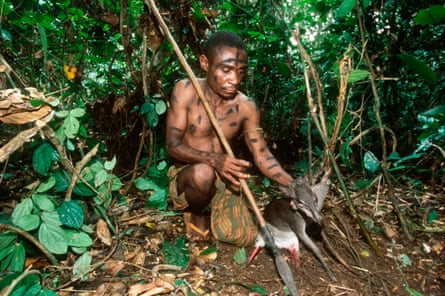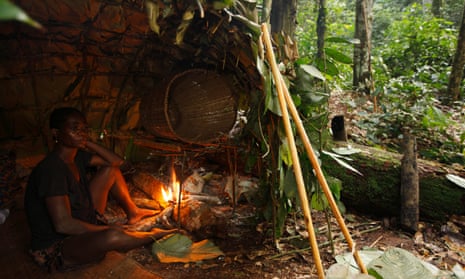WWF, the world’s largest conservation organisation, has been accused by leading tribal defence group Survival International of inadvertently facilitating serious human rights abuses against pygmy groups living in Cameroonian rainforests.
In a 228-page formal complaint to the Organisation for Economic Co-operation and Development, (OECD), Survival alleges that anti-poaching eco-guards who were part-funded and logistically helped by WWF, victimised the hunter gatherer Baka people, razed to the ground their camps, destroyed or confiscated their property, forced them to relocate and have regularly used physical force and threats of violence against them.
The complaint, which covers several years and is the first to be taken against a conservation group, alleges that WWF broke both OECD guidelines for the conduct of multinational companies and the UN declaration on human rights.
The complaint contains eye-witness accounts of alleged brutality, video testimonies, and reports from the Cameroonian press accusing the eco guards guards of violent actions against the pygmy groups. The complaint has not yet been heard.
The Baka, who have traditionally lived in what are now Cameroonian national parks, have been forbidden to enter many of their traditional hunting areas, even though their hunting is said to have minimal impact on the environment. Meanwhile, the forests have been overrun by militarised groups and large-scale poachers with buffer zones rented to safari companies. The net result, says the complaint, is that life has become impossible for the Baka.
The complaint, which will be heard in Switzerland, says that the Cameroonian national parks depend heavily on the WWF for finance and management expertise. “Eco-guards are supported financially by WWF, and often transported in WWF vehicles driven by WWF personnel to the villages or other places in which they have abused Baka ‘suspects’. They have even interrogated suspects in WWF-built facilities,” it says.

WWF has responded saying it provides human rights training for the eco-guards.
In a statement, the group said: “Discrimination, disadvantage and abuse are unhappily the common experience of the Baka and this has indeed been reflected in their relations with law enforcement agencies. WWF has long supported human rights training for eco-guards and provides this and wildlife training for all eco-guards and operational support for some eco-guard units in areas where WWF is itself active.
“From 2009 to about 2013, there was a period of more frequent and severe allegations of abuse in a context of arms trafficking, more involvement by the Cameroon military, more poaching, war in nearby areas of the Central African Republic and an influx of refugees. Protests from affected communities and WWF representations to the Ministry of Forests and Fauna seem to have been influential in a marked reduction in the incidence and severity of incidents since.”
It added: “For the most part, eco guards are protecting the integrity and resources of a [forest] zoning system that includes community forests, hunting and access zones vital to Baka communities. Communities whose resources are being ravaged by poaching are often calling for more enforcement, and current initiatives are exploring a greater role for community policing.
“WWF is not aware of any direct involvement by WWF staff in abusive activities or any of such activities taking place in WWF offices, and would take immediate and direct action if this was verified.”
The OECD Guidelines for Multinational Enterprises, which have been adopted by 44 countries, are the most comprehensive set of government-backed recommendations on responsible business conduct in existence today.
